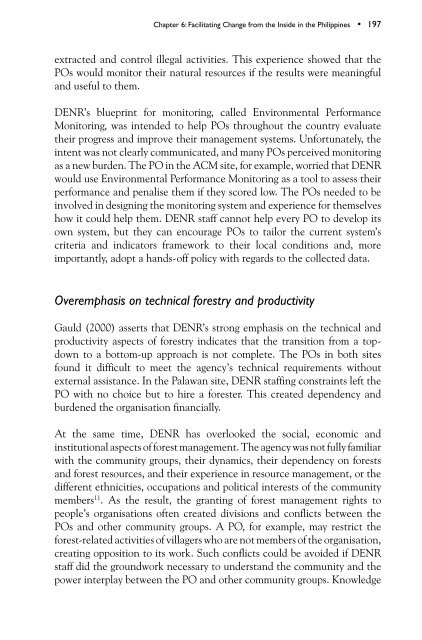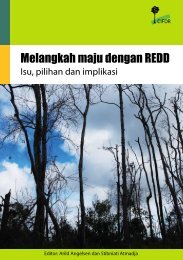Adaptive collaborative management of community forests in Asia ...
Adaptive collaborative management of community forests in Asia ...
Adaptive collaborative management of community forests in Asia ...
Create successful ePaper yourself
Turn your PDF publications into a flip-book with our unique Google optimized e-Paper software.
Chapter 6: Facilitat<strong>in</strong>g Change from the Inside <strong>in</strong> the Philipp<strong>in</strong>es • 197<br />
extracted and control illegal activities. This experience showed that the<br />
POs would monitor their natural resources if the results were mean<strong>in</strong>gful<br />
and useful to them.<br />
DENR’s bluepr<strong>in</strong>t for monitor<strong>in</strong>g, called Environmental Performance<br />
Monitor<strong>in</strong>g, was <strong>in</strong>tended to help POs throughout the country evaluate<br />
their progress and improve their <strong>management</strong> systems. Unfortunately, the<br />
<strong>in</strong>tent was not clearly communicated, and many POs perceived monitor<strong>in</strong>g<br />
as a new burden. The PO <strong>in</strong> the ACM site, for example, worried that DENR<br />
would use Environmental Performance Monitor<strong>in</strong>g as a tool to assess their<br />
performance and penalise them if they scored low. The POs needed to be<br />
<strong>in</strong>volved <strong>in</strong> design<strong>in</strong>g the monitor<strong>in</strong>g system and experience for themselves<br />
how it could help them. DENR staff cannot help every PO to develop its<br />
own system, but they can encourage POs to tailor the current system’s<br />
criteria and <strong>in</strong>dicators framework to their local conditions and, more<br />
importantly, adopt a hands-<strong>of</strong>f policy with regards to the collected data.<br />
Overemphasis on technical forestry and productivity<br />
Gauld (2000) asserts that DENR’s strong emphasis on the technical and<br />
productivity aspects <strong>of</strong> forestry <strong>in</strong>dicates that the transition from a topdown<br />
to a bottom-up approach is not complete. The POs <strong>in</strong> both sites<br />
found it difficult to meet the agency’s technical requirements without<br />
external assistance. In the Palawan site, DENR staff<strong>in</strong>g constra<strong>in</strong>ts left the<br />
PO with no choice but to hire a forester. This created dependency and<br />
burdened the organisation f<strong>in</strong>ancially.<br />
At the same time, DENR has overlooked the social, economic and<br />
<strong>in</strong>stitutional aspects <strong>of</strong> forest <strong>management</strong>. The agency was not fully familiar<br />
with the <strong>community</strong> groups, their dynamics, their dependency on <strong>forests</strong><br />
and forest resources, and their experience <strong>in</strong> resource <strong>management</strong>, or the<br />
different ethnicities, occupations and political <strong>in</strong>terests <strong>of</strong> the <strong>community</strong><br />
members 11 . As the result, the grant<strong>in</strong>g <strong>of</strong> forest <strong>management</strong> rights to<br />
people’s organisations <strong>of</strong>ten created divisions and conflicts between the<br />
POs and other <strong>community</strong> groups. A PO, for example, may restrict the<br />
forest-related activities <strong>of</strong> villagers who are not members <strong>of</strong> the organisation,<br />
creat<strong>in</strong>g opposition to its work. Such conflicts could be avoided if DENR<br />
staff did the groundwork necessary to understand the <strong>community</strong> and the<br />
power <strong>in</strong>terplay between the PO and other <strong>community</strong> groups. Knowledge
















